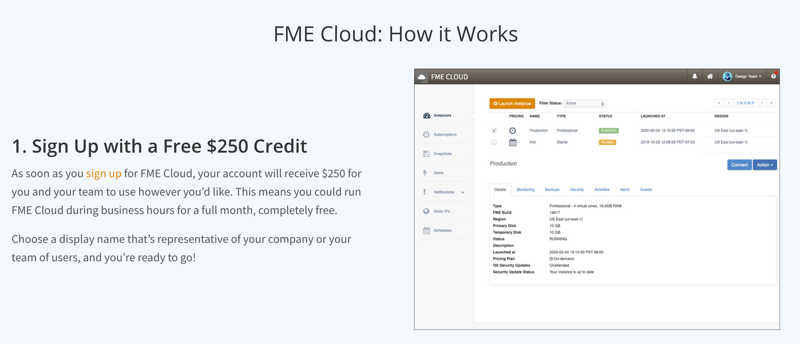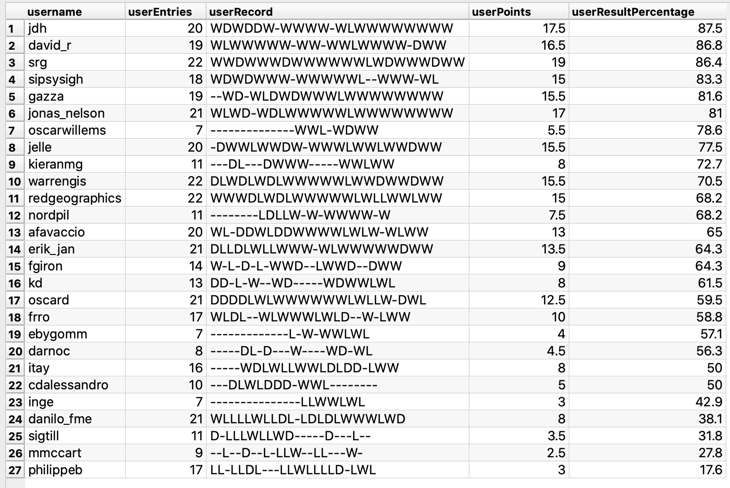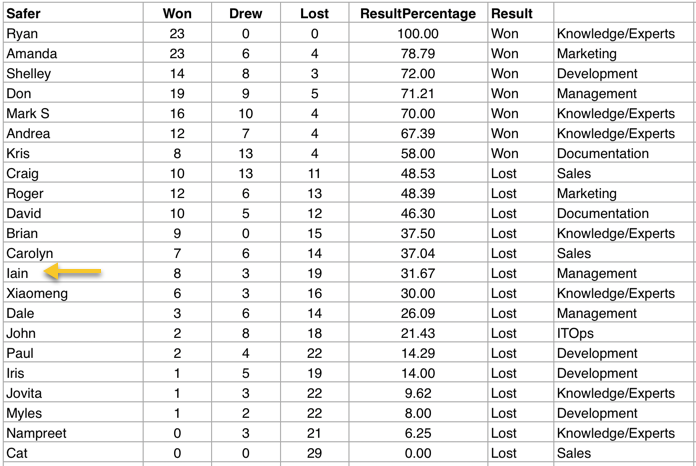Well FME'ers,
This week you were challenged by Iain McCarthy from Safe. As I mentioned, Iain is responsible for a lot of the supporting tech at Safe, but has a good grasp of FME for sure.
So how well did you do. Due to an oversight on my part, I forgot to tell Iain what username to enter, so you didn't get to know if you beat him or not.
That should make the results very interesting...
Answers1) Which of the following is NOT a real FME format?
- Continuous Acquisition and Life-cycle Support
- Digital Weather Markup Language
- FME Advanced Kriging Environment
- Neuroimaging Informatics Technology Initiative
- Snow Data Assimilation System
It seems that quite a lot of obscure formats have snuck into FME while I wasn't watching! I'd never heard of the Snow Data Assimilation System before, although I had heard of the Neuroimaging format, with the cute shortname NIFTI.
Iain's Answer: Continuous Acquisition and Life-cycle Support (Incorrect)
2) Dmitri from Safe posted some photos on Twitter last week of him holding up a hand to stop a Dalek invasion! What was he demonstrating?
- Gesture Control of the FME Server user interface
- People Occlusion in the FME AR app
- The Terminator transformer inside workspace bookmarks
- The new DEM And Lidar Elevations in KML (DALEK) format
- New security firewall options in FME Cloud
This is the photograph in question:

As you can see, it's the AR app and Dmitri it demonstrating People Occlusion. That means normally the daleks would be projected onto Dmitri's hand, but because of occlusion, they are placed in the right location and obscured by his hand. Very cool technology, coming soon to FME AR (if you have one of the latest devices).
I don't think there's any such thing as the DEM And Lidar Elevations in KML format - but there really should be!
Iain's Answer: People occlusion in the FME AR app (Correct)
3) Which one of these items do you get when you sign up for a new account on FME Cloud?
- A $250 credit towards the cost of using FME Cloud
- An FME Lizard sticker saying "I'm on Cloud 9"
- Two extra engines for the first month of use
- A free upgrade to an Enterprise level instance for two weeks
- A choice of a set of suitcases, a microwave oven, or a trouser press.
When you sign up for FME Cloud for the first time, you get a $250 credit:

I tried to think of some cheesy game-show prizes for the last option. How about a cuddly toy or a fondue set instead?
Iain's Answer: A $250 credit (Correct)
4) The list of updates to each build of FME is stored in a file called what?
- Change.log
- WhatsNew.txt
- UpdatesList.csv
- ChangeHistory.zip
- FMELatest.shp
The answer is WhatsNew.txt; although if it's obtained from the website it'll be tagged with the version number and name too; for example whatsnew_2020_0_2_1.txt
Iain's Answer: WhatsNew.txt (Correct)
5) Which of these items about the new Dynamic Engines is NOT true?
- The CPU time recorded in a job log indicates the dynamic engine cost
- FME Server can have a mixture of standard and dynamic engines, locally and distributed
- Dynamic engines are best suited to workflows with constant, 24/7 demand
- Automations can be used to decide when and how to reassign jobs to dynamic engines
- Dynamic Engines allow you to start an unlimited number of Server engines
Dynamic Engines (which may once have been mentioned as pay-as-you-go in a previous quiz) are the hot topic of the day. There have been a few articles created on the knowledgebase, plus a blog post.
To quickly fill you in, with Dynamic Engines you pay for a set amount of processing time, say 10 hours. You can then start up as many engines as you like to make use of that 10 hours.
For example, I could run one engine, processing continuously for 10 hours. Or I could run 10 engines for 1 hour. Or 1000 engines for 36 seconds each! It all depends on how you want to set up your processing.
I think that covers one wrong answer (yes you can start as many engines as you like) and those engines can be a mix of types (so you can have dynamic engines to support your standard engines) and they can all be either local or distributed.
Each dynamic engine is assigned to a queue and you can use Automations to decide when jobs should start to be sent to a dynamic engine queue (I don't know right now if there are any other methods).
What's really nice is that you only pay for processing time. So if a workspace ran for 10 minutes, but the log reported only 30 seconds of CPU time, then that's the cost (30 seconds, not 10 minutes).
So the wrong answer is that Dynamic Engines are best suited to constant demand. That's not true at all. If you have constant demand and 24/7 use of an engine, it's usually better to have a standard FME license for those jobs. The cost per hour would be cheaper.
But if - let's say once a month - you have a bulk process taking place, then that's when you could use Dynamic Engines.
Another great scenario is when you have engines processing data streams. For example, you have a TCPIPCaller listening for messages, that arrive approximately 1 message per minute, and take 10 seconds to process. You have a workspace running continuously, listening for these messages. A Dynamic Engine only uses 10 seconds per message, even if the workspace is running continuously, because listening for data is not processing!
For more information, start with this blog post, and then move on to this knowledgebase article.
Iain's Answer: Dynamic engines are best suited to constant, 24/7 demand (Correct)
6) We're considering a webinar devoted to Shapefile format. To open, what late 80s/early 90s song lyrics have we adapted into an ode to Shapefile?
- Heaven is a Place on Earth
- Ice Ice Baby
- Video Killed the Radio Star
- I Will Always Love You
- Mambo No 5
So many of you said "I Will Always Love You" - but I think that song is reserved for Don and XML! I think we could adapt any of those lyrics to praise Shapefile, but the one that instantly sprang to mind was Ice Ice Baby!
A little snippet is:
Stop
Collaborate and listen
Esri is here with their brand new invention
Shapefile
Grabs a hold of me tightly
Storing my data, daily and nightlyOh, the 80s has a lot to answer for! I've no idea if we'll do the webinar, let alone get Dale to rap that live on air, but it's going to be fun to find out.
Iain's Answer: I Will Always Love You (Incorrect)
ScoresWell. How did you do? Let's see:
- Quiz Week: 29 (May 26/2020)
- Number of Entries: 30
- Best Score: 6
- Worst Score: 1
- Average Score: 4.37
- Perfect Scores: 3
- Easiest Question: 3 (28)
- Hardest Question: 6 (4)
Three perfect scores and a high average. But Iain scored well too, so let's see the overall ratings...
- Beat Iain: 19
- Equalled Iain: 3
- Were Beaten by Iain: 8
Oh... If only Iain had noticed in Q1 that the shortname for the FME Advanced Kriging Environment would be FAKE! That would have been a win. Oh well.
The overall score is now...
- Users 15 Safers 7
Eugh. Your table is:

A new leader! How exciting.
The Safer table is:







